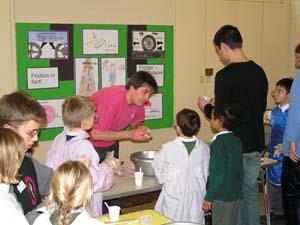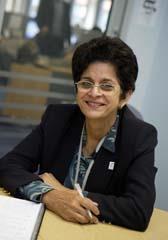Meet Chris George and Leila Elliott, recipients of the 2008 RSC Schools Education Awards
Chris George, chemistry teacher at the Royal Latin School, Buckinghamshire, and Leila Elliott, education consultant for the North East Process Industry Cluster's (NEPIC) Science Education Unit, are the recipients of the 2008 Royal Society of Chemistry (RSC) Schools Education Awards.
The aim of these annual awards is to recognise teachers and other professionals who have made significant contributions to the teaching of chemistry in schools and colleges. This year's award winners each receive a certificate and £250.
Sharing a passion for chemistry

Chris George's award acknowledges 'his tireless and inspirational promotion of chemistry to his pupils and their parents as well as to students from a host of local schools. His innovative approach to the subject within his local area and more widely can be seen as a case study of what high-profile teaching can achieve'.
A chemistry graduate of the University of Southampton, George joined the Royal Latin School (RLS), Buckinghamshire as head of chemistry in 1999 following stints at Cranbook School, Kent and then the Royal Grammar School, Guildford. During his first year at RLS George was charged with writing the school's successful specialist science school bid, which reflected his approach to teaching. 'I love to share my passion for chemistry with everyone', he admits.
Under his guidance, the RLS runs several activities for local primary schools including science fairs. Hundreds of Year 2 students do fun, hands-on experiments, such as making bath bombs and silly putty, with RLS sixthformers acting as mentors. 'The experiments use household products so the youngsters can continue their investigations at home', explains George, 'and to support this we run evening events for parents to show them what experiments they could do at home with their children'.
Follow-up science fairs for Year 5 groups, held at the RLS, encourage students to investigate the properties of smart paint, bubble mixtures etc, record their observations and come up with explanations. Sixthformers again act as mentors, and gain valuable experience. Other initiatives at the school set up by George include: a sixthform research group linked with the Open University, which studies smell detection; a science club for Years 7 and 8; and a lecture series for the same age group designed to inspire the students to go on to study the sciences.
Now leader of the specialism programme at the RLS, George works with the school's other departments to develop projects that show how science can be used to enhance the curriculum content of other subjects. Working with the art department, he has set up a project called Science in history in which an artist in residence works with Year 12 art students to explore different styles of art through works depicting scientists and science. 'This encourages these non-science sixthformers to read and learn more about the history of science', he says. His latest innovation, developed with colleagues in the French department, saw a group of sixthform French students and science students present the school's science fair in French to students at a primary school in Béziers in the southwest of France.
George's next mission is to set up a science club for Year 9 and 10 students, an age group in which students often develop an indifference to science. 'I want to instil in students its okay and cool to spend time doing extra-curricular science activities throughout their school career'.
Chemistry in modern contexts

The award for Leila Elliott highlights 'her innovative work in establishing and building up the NEPIC Science Education Unit (SEU). Its work in raising the profile of the chemical industry and in ensuring that it is seen in a positive light by young students has been extremely important in the region as an illustration of what can be achieved in altering entrenched views'.
Elliott has devoted her professional life to promoting interest in chemistry among young people. For 21 years she taught chemistry in schools in the Tees Valley. Over the past 10 years she has used her teaching experience to develop the SEU's programme of activities for students and teachers. 'Living in such a wonderful area for chemistry, as a teacher I used to take my students to as many industrial sites as I could because everything in the chemistry syllabus was exemplified in industry in the Tees Valley region', she explains.
The SEU programme, developed in consultation with local teachers, now offers a range of activities for 5-19-year olds and continuing professional development (CPD) events for teachers thanks to links with industrial partners and universities. Among these activities the SEU organises the region's Salters' Chemistry Festivals and RSC events such as the Schools' Analyst and Top of the Bench regional competitions and Chemistry at Work events, which over three days allow 600-800 students to hear how local companies use chemistry. NEPIC also works with the University of York to host its Children challenging industry project in the North East, which gives 9-11-year olds experience of real-life science through visits to over 30 local companies.
More recently Elliott has played a lead role in organising the RSC-led Chemistry for our future-funded events in the region for Teesside University. 'Our emphasis [at the SEU] is on changing young people's perceptions of the chemical industry', she says, 'through these visits they see that what they focus on as "pollution" emitted from on-site chimneys is in fact just steam'.
For secondary school and post-16 teachers, the site visits offer insight into industry and the varied careers open to chemists in the pharmaceutical, biotechnology and chemical industries. And with the introduction of new Key Stage 4 science specifications, the SEU's programme is proving more popular than ever with teachers who want modern industrial contexts for chemistry covered in the classroom.






No comments yet